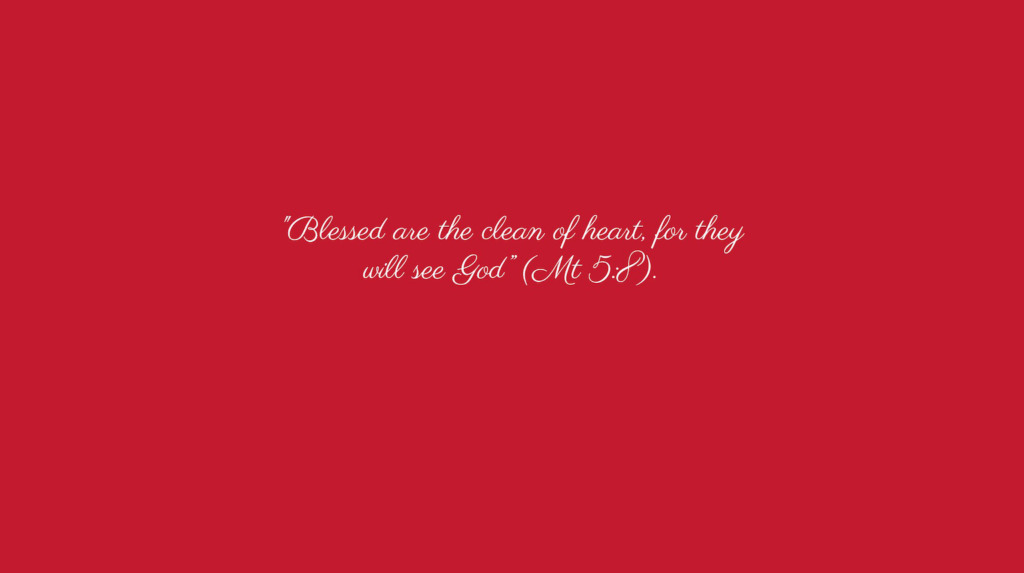Matthew 5:8, “Blessed are the clean of heart, for they will see God,” is, perhaps, one of the most wonderful, yet personal and daunting of the beatitudes.
Jesus’ promise is awesome: The clean of heart (sometimes translated as the “pure” of heart) “will see God.”
Yet, within this promise is a challenge, made thornier because of the myriad distractions and stresses in our lives and world today: To see God, we need to be “clean of heart.”
What does this mean, and how can we, today, be “clean of heart”?
In Jesus’ time, the term “clean” was often tied with Jewish purity laws, which instructed Jews to avoid actions, foods or practices that were “unclean.”
In referring to those “clean of heart,” Jesus shifts the focus from observance of purity laws – outward actions – to an inner characteristic that has far-reaching implications for individuals and the community.
In a 2007 sermon on Matthew 5:8, preacher to the papal household, Father Raniero Cantalamessa offers that a clean heart (“purity of heart”) is not necessarily a specific virtue, but a “quality that should go along with all the virtues, so that they are truly virtues and not rather ‘glittering vices.'”
A clean (pure) heart brings a humble, honest, unhypocritical intention to all good actions.
A clean heart is humbly focused on pleasing God, whether praying “in secret” behind closed doors (Mt 6:6) or in church on Sunday.
With such simple intention, St. Augustine of Hippo writes of Matthew 5:8 that God “is seen with the heart! As it is written elsewhere, ‘And in singleness of heart seek him.'” Just as God’s light cannot be seen “except with pure eyes; so neither is God seen unless that is pure by which he can be seen.”
Today’s society poses many challenges to nurturing and maintaining a clean or pure heart. The competitive nature of many activities, even some charity events, can skew participants’ intentions to be more about being seen to “do good” than pleasing God.
The many roles we take on at work, in our families and faith communities can blur our sense of true purpose as, first, beloved children of God.
The pace of our lives and the dissonance when worldly concerns clash with spiritual longings can make it difficult to center ourselves and remain mindful of what is truly important. We might find that, although we are doing the “right” things, in the quiet of our hearts, peace eludes us.
Despite the difficulties we face in nurturing a clean heart in an extremely challenging world, as people of faith, we have good reason to be encouraged.
The Church’s tradition of prayer is a deep reservoir of guidance and strength, offering rich and diverse opportunities to sit with God. Eucharistic adoration, silent retreats, Liturgy of the Hours – these can bring us to the quiet and focus we need to deepen spiritually and establish an ongoing practice of taking private time with God.
Working with a spiritual director can help us better understand where God is leading us and sort out our intentions throughout our journey. Sometimes, we need a wise spiritual guide to ask just the right questions to lead us to a deeper level of faith.
The sacrament of reconciliation provides us with opportunities to continue to examine our intentions and conscience, to “come clean” with God so we may move ahead refreshed, abundantly blessed.
Reading sacred Scripture and inspirational writings from the saints feeds the soul and mind, and helps broaden our understanding of God’s abiding, amazing love.
Nurturing relationships with others of faith is also a good way to reinforce prayer, reading and other practices, and “encourage one another and build each other up” (1 Thes 5:11).
Jesus’ promise in Matthew 5:8 is awesome and challenging, but it is not impossible. Like so many others before us, inspired by faith and focused on service, with humble singleness of heart, we can take heart, a clean heart, and one day see God.
– – –
Pratt’s website is www.maureenpratt.com.

